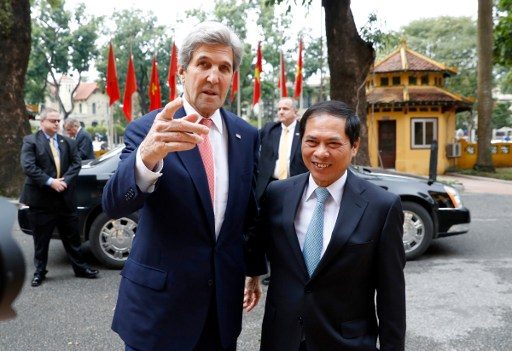SUMMARY
This is AI generated summarization, which may have errors. For context, always refer to the full article.

HANOI, Vietnam (UPDATED) – John Kerry began his swansong tour as US Secretary of State in Vietnam on Friday, January 13, defending Washington’s ‘pivot’ to Asia in the face of President-elect Donald Trump’s threat to dump a key regional trade deal.
Vietnam has been at the centre of President Barack Obama’s Asia embrace, marked by the lifting of a wartime-era arms embargo, major growth in trade and the signing of the massive Trans-Pacific Partnership (TPP) trade pact.
Yet years of effort to secure support for the trade deal, the cornerstone of Obama’s Asia strategy, have unraveled spectacularly with Trump vowing to scrap the pact on his first day in office.
The TPP aimed to unite Washington’s east Asian allies in trade, creating a counterbalance to a rising China and rewarding political and economic reform.
All that is now in question with Trump blaming unfettered global trade for the loss of American jobs.
But Kerry sought to reassure his Vietnamese hosts that Washington was not set to turn its back on trade or its Asian allies.
“Now, it’s no secret that the future of the Trans-Pacific Partnership in itself is uncertain,” he said, admitting that globalisation has proved “unsettling” for American voters.
“So I cannot predict what the new American administration is absolutely going do with respect to trade, but I can tell you that the reasons for the TPP haven’t changed.”
Speaking in Vietnam’s buzzing commercial centre Ho Chi Minh City, Kerry insisted that free trade creates jobs and that “protectionist trade policies won’t work”.
He also urged the communist nation to stay the course with economic reforms and embed environmental and labour protections chiselled out during the complex TPP negotiations.
Political and personal
Vietnam War-era naval officer Kerry’s visit, his fourth to the communist country as America’s top diplomat, is both political and deeply personal.
He won a Silver Star for his service during the Vietnam War after beaching his patrol boat and storming ashore to shoot dead a Viet Cong ambusher in Ca Mau province in 1969.
Kerry ultimately came to see the war as a mistake and after his return from combat campaigned for peace. Later, as a senator then as secretary, he worked to normalise ties.
In Hanoi on Friday morning, Kerry met acting foreign minister Bui Thanh Son and Prime Minister Nguyen Xuan Phuc.
“There have been a lot of steps forward but there are still some challenges as you know,” he said, after a reporter asked him about Vietnam’s patchy rights record.
The communist country routinely jails dissidents and government critics.
On Saturday, Kerry will head to the Bay Hap river in Ca Mau on Saturday to revisit the site of his 1969 ambush and discuss how to protect the region’s delicate ecosystem from climate change.
Trade alliance
The relationship between the two countries has transformed since the painful and bloody war era.
The United States is Vietnam’s top export market and trade between the pair has tripled in recent years, along with a major boost in US investments in the manufacturing hub.
“Kerry’s visit underscores the importance of Vietnam in the US-Asia policy,” Netherlands-based Vietnam analyst Jonathan London told AFP.
Simmering tensions with Beijing over its military build-up on islands in the South China Sea were also on the agenda.
Vietnam is seeking US backing in the face of increasingly aggressive actions by China in the strategic waterway.
Washington has remained neutral in disputes with China in the South China Sea, insisting that freedom of navigation must be respected in the oil-rich shipping route.
But Trump’s nominee to replace Kerry, former oilman Rex Tillerson, this week called for sending a “clear signal” to China to stop building on disputed islands. – Rappler.com
Add a comment
How does this make you feel?
There are no comments yet. Add your comment to start the conversation.